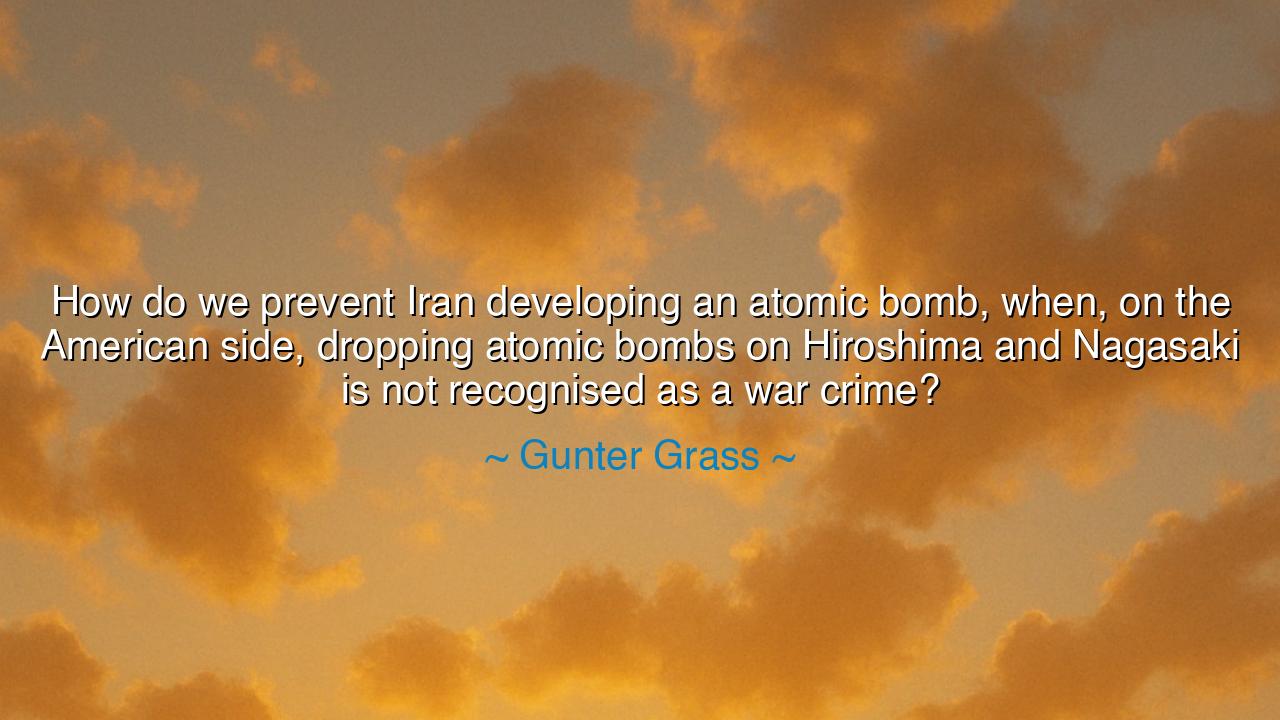
How do we prevent Iran developing an atomic bomb, when, on the
How do we prevent Iran developing an atomic bomb, when, on the American side, dropping atomic bombs on Hiroshima and Nagasaki is not recognised as a war crime?






Hear, O seeker of wisdom, the words of Günter Grass, the German poet who bore the scars of the twentieth century and who spoke with the sharpness of conscience: “How do we prevent Iran developing an atomic bomb, when, on the American side, dropping atomic bombs on Hiroshima and Nagasaki is not recognised as a war crime?” This question is not merely about nations and their weapons, but about the very soul of justice. For he names the hypocrisy of power—that those who wielded fire upon cities claim the right to forbid others from doing the same, while never confessing their own transgression.
The origin of this thought lies in the closing days of the Second World War. The United States, in August 1945, unleashed atomic bombs upon Hiroshima and Nagasaki, annihilating tens of thousands in a blinding instant, and leaving survivors haunted by radiation’s invisible torment. These acts ended the war, yet they birthed an age of fear where humankind could destroy itself with a single decision. Grass, who grew up under the shadow of Nazi tyranny and lived through the ashes of Germany, saw with clear eyes that to excuse such destruction as “victory” while condemning others who seek the same weapon is to fracture the moral order of the world.
Consider the hibakusha, the survivors of Hiroshima. Many lived not only with wounds upon their bodies but with stigma, treated as outcasts because of radiation’s curse. Their lives were testimonies not to triumph, but to suffering. And yet, in the halls of power, the bombings were not tried as crimes but were hailed as the necessary price of peace. Grass asks us: how can humanity, while honoring these wounds, claim the moral right to forbid others from seeking the same weapon of terror, unless it first names its own sins? Without truth, prohibition becomes hypocrisy.
History offers a parallel. After the First World War, the victorious powers sought to prevent Germany from rearming, even as they themselves held vast arsenals. This double standard festered, giving rise to resentment, anger, and ultimately new conflict. Grass warns that in the same way, to forbid Iran or any other nation from pursuing nuclear arms, while refusing to acknowledge the crime of Hiroshima and Nagasaki, risks fueling the same resentment. The lesson is not that all nations should bear these weapons, but that true moral authority must begin with honesty.
The deeper meaning of Grass’s words is this: justice must be universal or it ceases to be justice. If only the weak are condemned, while the strong write themselves as innocent, then the world order rests upon lies. To prevent the spread of atomic weapons, nations must not only threaten punishment but also confess their own abuses, disarm where they can, and bind themselves under the same law they demand of others. Without this, the shadow of hypocrisy will ensure that peace is fragile, and fear will always drive nations to grasp for weapons in the night.
What, then, is the lesson for us, O listener? It is to live without double standards in your own life, for hypocrisy in the small mirrors hypocrisy in the great. If you demand honesty, be honest. If you forbid cruelty, do not excuse your own cruelty. If you call for peace, do not delight in another’s downfall. And as a citizen of the world, demand that your leaders hold themselves to the same measure they apply to others. Only in this way can the word justice shine with true light.
Therefore, remember the wisdom of Günter Grass: the world cannot prevent new Hiroshimas by silence about the old. To break the cycle, humanity must first confess its own crimes, and from confession build a path of humility, equality, and peace. Without this, treaties will crumble, fear will spread, and the fire of the atom may once again fall from the skies. But with truth as foundation, nations may yet lay down their weapons and choose a different path—the path of life.






AAdministratorAdministrator
Welcome, honored guests. Please leave a comment, we will respond soon